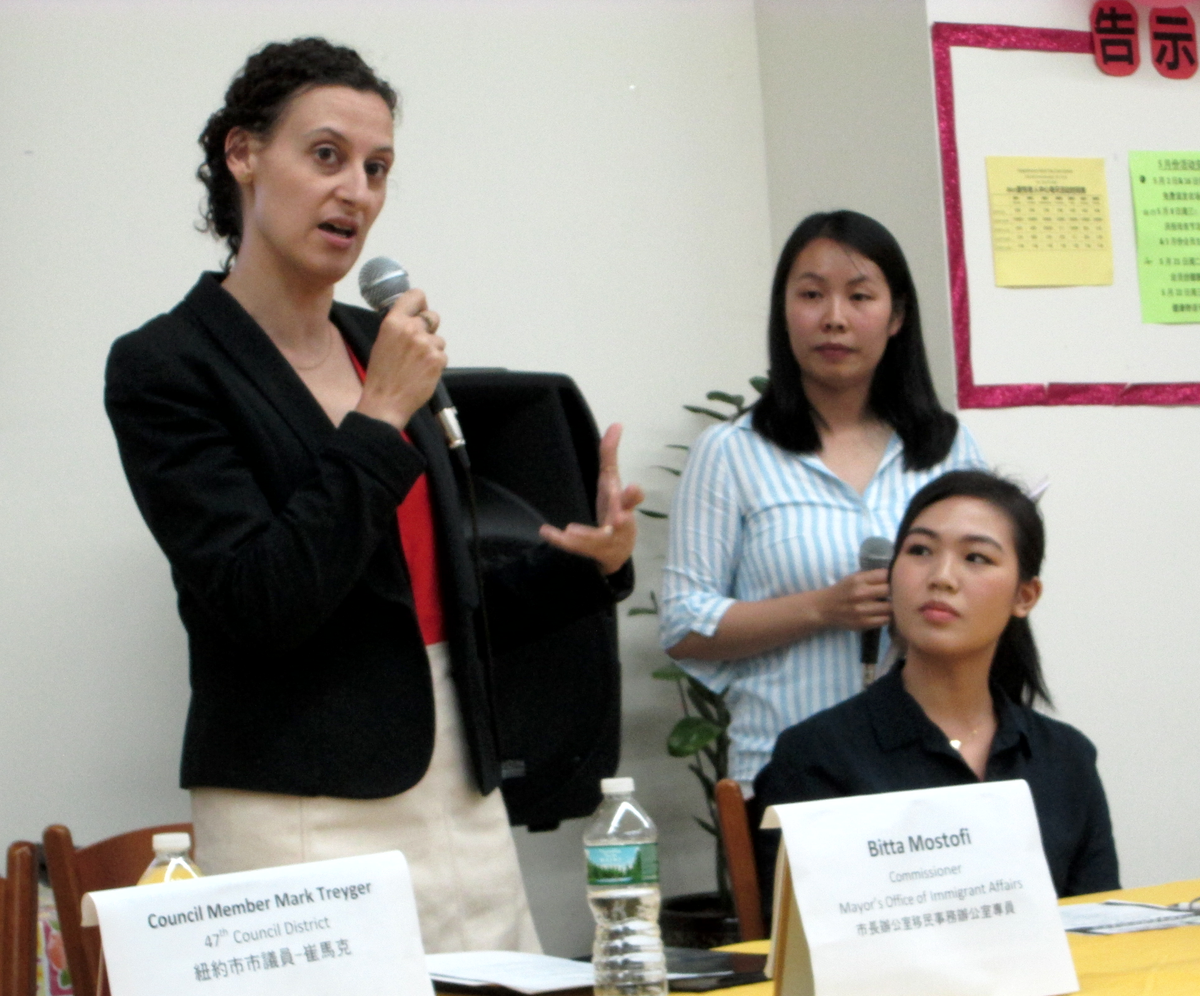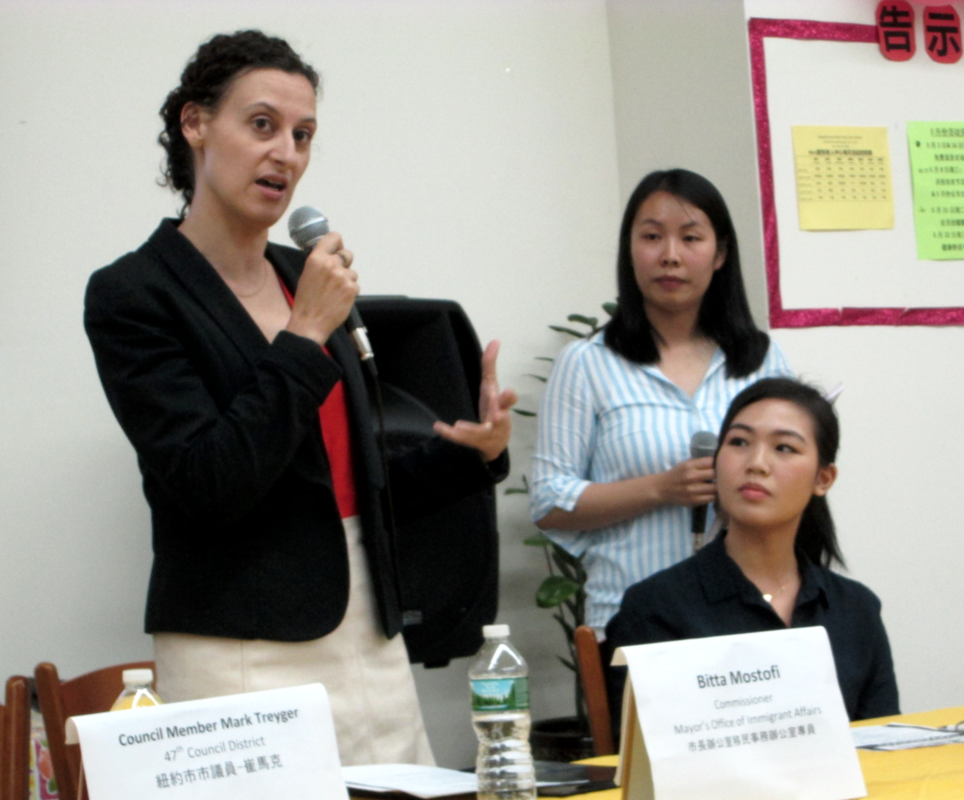Demystifying Census 2020: It’s About Money, Power & Respect

BENSONHURST – The community center in the heart of Southern Brooklyn’s largest immigrant enclave was packed, as officials tried to demystify the 2020 census to a roomful of residents, many of whom spoke little English. A volunteer translated the speakers’ remarks into Mandarin and Cantonese for the seventy people in attendance, a majority of whom were Chinese.
“If you care about education, then you must care about the census,” said City Councilman Mark Treyger who represents the area and organized the meeting. “If you care about affordable housing, especially for seniors, you must care about the Census. If you care about the subway system, especially in a rapidly growing neighborhood, you must care about the Census.”
Treyger was one of eight city officials and community leaders who spoke at a 2020 Census Town Hall in Bensonhurst this Tuesday, May 28, part of the City’s outreach efforts intended to increase census participation in the area.
It all comes down to money. Last time the Census took place, in 2010, Brooklyn had one of the lowest turnout rates in the entire country at just above 50% participation, said Julie Menin, the director of the NYC Census Office. The 2020 census will determine how much funding states will receive going into the next decade; an undercount in New York would reduce federal funding for programs like Medicaid and food stamps in the state by billions.
“We’re talking about $700 billion on a national level, $70 billion as a state,” said Councilwoman Carlina Rivera, co-chair of the NYC Council’s 2020 Census Task Force. “There is no infinite number of dollars or resources,” Rivera said. “We really have to make sure we get our share of that money.”
To do that, the City will have to increase turnout in Bensonhurst, which has both the largest population and the largest foreign-born population of any neighborhood in Brooklyn. According to a 2013 survey, 53.9% of Bensonhurst’s 144,159 residents were born outside of the United States; over 30,000 of these residents are Chinese immigrants.
The panelists acknowledged that many immigrants in the community are not citizens and that many of them do not speak English. “We want to make sure you have access to people you trust,” said Rivera.

In 2010, the census form asked for each household member’s name, age, date of birth, race/ethnicity, Hispanic origin, gender, homeowner status, and relationship to the person filling out the census form. The Census does not and has never asked for a Social Security number, financial information, or any sort of money or fee. But the Trump administration has made a high-profile push to put a new question on the 2020 Census: “Is this person a citizen of the United States?”
Several panelists denounced this decision as an attempt to sow fear and suppress census participation in immigrant communities.
“The Trump administration is doing everything that they can so that immigrant communities, poor communities, communities of color, do not take their rights to participate in the census,” said Bitta Mostofi, Commissioner of the Mayor’s Office of Immigrant Affairs.
“This is an attempt, quite frankly, to get people to not answer the census,” said Julie Menin. Last month, she and Mostofi co-authored a Daily News op-ed condemning the citizenship question; the two are among the many plaintiffs alleging that the question is unconstitutional. The Supreme Court is expected to pass a ruling on the citizenship question this June.
The panelists stressed that groups like ICE had no involvement with the Census and that census takers are sworn to secrecy.
“Immigration is not gonna knock on your door, only the census people,” assured Nancy Tong, the district’s female Democratic district leader and the first Asian-American elected official in Brooklyn. “If we lie when we answer the census, we do not benefit.”
Wennie Chin of the New York Immigration Coalition agreed.
“It breaks down into a DMX quote,” Chin said: “Money, power, and respect.” Money, she explained, meaning a fair slice of the $700 billion federal funding “pie”; power – “the political power that comes with accurate representation;” and respect – “not letting Trump treat communities with disrespect, implying we’re less than American.”

Jeff Behler, regional director for the U.S. Census Bureau, encouraged people to combat misinformation about the Census in their day-to-day lives.
“Start the conversation on the subway, on the bus, at your community center, at your favorite restaurant, that the census is safe, that the census is easy, and that the census is important,” said Behler.
This year, Behler says, the Census is more accessible than ever, being available online for the first time. Because many in the Bensonhurst area and low-income areas more generally lack computer access, starting in March 2020, census stations will be set up in every NYC public library. People can also respond to census questions over the phone in one of thirteen languages, including Arabic, Chinese, Haitian Creole, Russian, and Spanish.
As for those who don’t or can’t fill out the Census themselves, to quote DMX again, rather than waiting for you to get it on your own, the Census is going to deliver it to you. Starting in May of 2020, census workers will go door-to-door in local communities, armed with I.D.s and smartphones, looking for those who have yet to self-report by answering the questions online, on the phone, or by mail.
Applications for census worker positions (which pay $25 an hour, with flexible hours to boot) are available through 2020 – including for people with green cards, who Behler says will receive a waiver permitting them to do census work. More information on positions at the U.S. Census Bureau is available online at 2020census.gov/jobs, or by phone at 1-855-JOB-2020.



